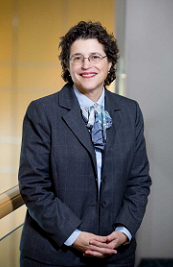 Julia V. Johnson, MD |
Not so long ago, the phrase “part-time careers in medicine” would have been an oxymoron. Medicine is, after all, a demanding profession in which individuals typically work long hours. But Julia Johnson, MD, chair and professor of obstetrics & gynecology, has witnessed the notable rise of interest—and success—in part-time careers in medicine, an observation based on her many years as an academic administrator helping new physicians chart their futures.
She shared her insights with medical providers, administrators and other interested audience members on March 23, at Knowles Hall on the Memorial Campus of UMass Memorial Medical Center. Dr. Johnson’s talk, Changing How We Work: Part-time Careers in Medicine, was presented by the UMass Memorial Diversity Office in celebration of Women’s History Month.
“As a new generation enters the workforce, there are increasing requests for part-time positions,” said Johnson. “As a leader in my field, I have to recognize these requests.” Drawing on research—her own and others’—in nursing, obstetrics & gynecology and other medical specialties in academic medical settings, and informed by historical data reaching from the 1970s to the current day, Johnson extrapolated conclusive evidence that part-time careers benefit employers and patients as well as employees.
For employees, the benefits are obvious: greater satisfaction on the job, and more time to pursue personal goals off the job. For employers, one benefit—that part-time workers are often more productive than their full-time counterparts—has proven to be a pleasant surprise. Less surprising but equally pleasing is data demonstrating the financial value and high quality of care provided by part-time physicians.
Johnson also proffered some predictions for the future. While the program was presented in honor of Women’s History Month, her overarching conclusion is that part-time work has entered the mainstream and is no longer just for women or parents of young children. “Both genders are increasingly interested in part-time work, and not all part-time seekers are parents,” she said. “Part-time faculty and medical professionals will increase in numbers and importance. I’ll be writing articles on this for years to come.”
Related stories: